#still haven’t quite figured out a good way of turning grayscale into color
Text

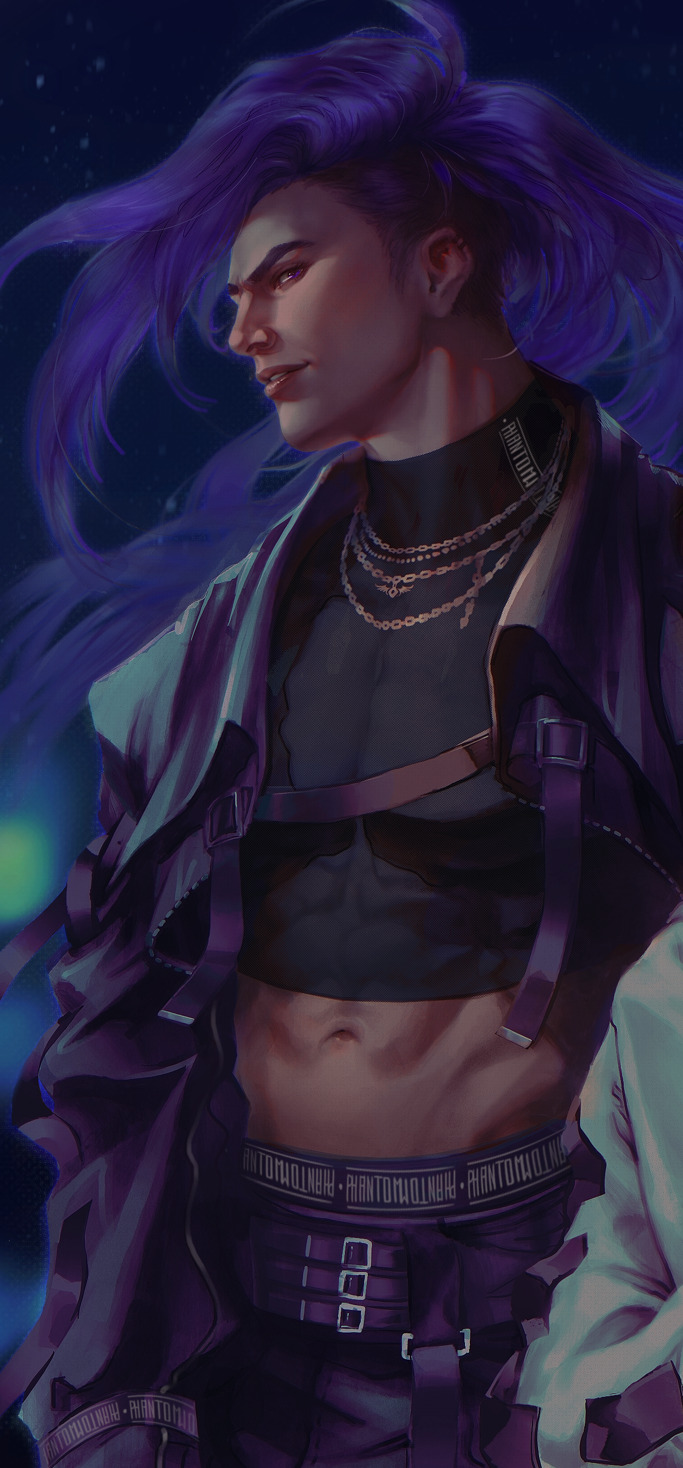

\\\ D.N Angel \\\
Who remembers this show? (っ´ω`c)♡
#still haven’t quite figured out a good way of turning grayscale into color#I am fashion blind (:#dn angel#is it just me or has there been a lot less community interaction lately??#I’m too old for new style SoMe…#I just want to hangout and make art with ransoms#teenage obsession#daisuke#niwa#dark#mousy#fanart#digital art#artists on tumblr#procreate#midnight#anime#manga#oldie but goodie#portfolio
30 notes
·
View notes
Text
lead me into the light | emerald duo platonic soulmates
For all the years he has lived, Phil has lived without a soulmate, and as a result, without color. And he's perfectly fine with that.
Then he touches down on a battlefield for fun, and meets the eyes of a total stranger.
And as the world goes from monochromatic to full of color and more beauty than he had ever imagined, Phil knows that everything is going to change.
(But a mortal's life is only so short, after all.)
|||
My twitter account voted a series of polls to decide what fic I was gonna write, and they decided on an emerald duo platonic soulmates au fic that was angst with a happy ending ! Link will be in the notes, but here’s a bit of the start to get you into it!
|||
There are a few constants that Phil holds in his life, has always held, and will always hold.
The first, the most glaring, is the centuries that stretch far back in his past and the ones that he approaches in the present. It is the fact that he cannot die from old age or from hunger or from thirst, that it is only by injury that he could possibly be taken down for good.
The second is his lifestyle. Always a traveler, never with a permanent home. For fear of being targeted, or not wanting to cause that kind of disturbance, and because Phil truly desires to wander the world on his own terms, he travels. Visits every city and explores every nook and cranny of it as it changes over the months and years and decades. He visits fields where he spilled blood and watches others spill blood in that very spot a few years later. He carves out temporary places, favored nooks to fish in and well-loved corners of libraries or especially nice inns, but he never lingers around others who might question his unaging face.
And the third is the grayscale in which he sees the world, shades of black and white and everything in between, the only hues he’ll ever lay eyes upon.
(Soulmates are rare. They are not a common thing, they are often considered blessings by the gods to live your life devoid of color, the trials and tribulations to find your other half.)
(Phil has met quite a few gods, in his time of wandering. That’s just straight bullshit.)
He’s lived decades upon decades without a soulmate, and is perfectly content to keep living without one. Where others find agony in not being able to separate the color of the leaves in autumn, Phil has long since made his peace in seeking out the beauty of the world in other ways. The speckled patterns of a newborn fawn in spring. Waves darkening the shade of the sand upon an ocean. The way his lover’s hair seemed to melt into the endless night sky.
(Gods are exempt from the concept of soulmates, and Death had no answers for Phil when he asked her why he had been cursed to live like this, nor could she bring his sight into full color, even with all her otherworldly abilities.)
(“Maybe there is someone out there,” she said to him one night as he rested against her shoulder, looking up at the star-studded sky from where they sat within the earth. “And you just haven’t found them yet.”)
(“I don’t think I need to find anyone else, honestly,” he replied, turning to look at her. She was a thousand times more dazzling than any sky could behold on its own. “You’re all I need, I’m not letting this kind of stuff stop me from living my life any longer.”)
Their visits were infrequent, but time means nothing to a god and a human whose chances of death are slim as long as he keeps himself out of trouble.
Phil’s wings flare out as he touches down on a battlefield stained with darker shades of gray, determined to find go and find some trouble, if only because this past year has been incredibly boring otherwise.
“My name is Philza,” he introduces himself to the general of the army, hand raising in a salute that had definitely been appropriate last time he was on a battlefield, and he doesn’t really care much whether it still holds up. He takes his hat off as well, holding the striped material against his chest. “And I’m here to help, if you’ll have me.”
His reputation, that of the Angel of Death, precedes him. For all his intentions to keep away from sticking around civilians as they aged, wars and skirmishes would always be an exception.
It was a secret sort of thrill, to throw himself into the fray of a conflict he would hardly remember by the next one. To release the fearlity that he kept tightly wound up inside him, to splatter blood on a blade and sink arrow after arrow through the eyes of assailants. Nevertheless, the legends of his help follow him wherever he goes, and the look of relief on the general’s face says enough on that matter.
A night’s rest later, he’s led across the loosely set up encampment to one of the larger tents. As he walks, Phil tips his head up to gaze at the sky. There was no smooth texture, instead fuzzy clouds crowd the sky, and Phil tilts his head, noting the approaching rain.
Once inside the tent, the general nods at him, speaking before Phil can even courteously extend a greeting.
“We’re going to have you take command of the Red Snakes force, over here.” The general indicates to the map spread out on the table between them, pointing to a marker that Phil notices has a small symbol carved into it. It’s a small squiggle, barely noticeable, but it stands out against the other symbols carved into the various markers that Phil gathers to represent the different sub-forces that this general is commanding.
It’s helpful primarily, though no one knows of his own color-absence, he does appreciate the carved symbols. As an afterthought, it’s interesting. He wonders who else is color-absent this high up in the commanding forces. A rare thing, to be sure, not that he’ll bother to interact with them for that reason. He’s here to help spill some blood, not hear some poor sap moan about how they feel they’ll die on the battlefield before meeting their soulmate.
Phil’s eyes snap from the squiggly symbol back to the general’s words, tuning in mid-sentence. He’s definitely missed some information that was probably crucial, but he’ll get somebody else to relay it to him later. For now—
“Your co-commander already knows this, of course, but I figured I would inform you separately so you were up to date on our intel before you began discussing the best course of action.”
“Sorry, my who?” Phil blurts, brow furrowing, heart sinking a little.
“You’ll be co-leading this group, at least for now.”
Phil lightly bites the inside of his cheek to keep his face schooled appropriately. He knows what this is. It’s a nicely phrased term to cover up the fact that he’s being babysat because they don’t trust him with their armies, so they’ve appointed another commander to watch over him.
On one hand, it’s fucking annoying to be watched like that. On the other hand, that does mean Phil can totally push all the actual commanding duties off to the other guy while he buggers off to do what he pleases. Maybe this won’t be too bad after all, honestly, it depends whether he gets some kind of suck up as a co-commander or not.
“Commander Technoblade has shown great leadership prowess in recent skirmishes, so it was determined that he could take up control of a new force until your support and guidance,” the general continues, and Phil’s heart sinks further.
Oh, gods, they think he’s some kind of trainer, some kind of mentor to a kid who’s been handed too much responsibility for his age and will die in a week. Not this shit again. “Sounds great,” he lies through his teeth. “When do I meet him?”
There’s a soft knocking against the flap of the tent, and the general lifts a hand. “That’ll be him. You can come in, Technoblade.”
“Yes sir,” a deep voice intones. There a shuffling of fabric just as Phil turns to greet whoever this guy is, and—
And his vision explodes with—
Everything is so bright, even brighter than the white gleam of the sun in his eyes. Phil blinks furiously as what he’s certain is color blooms across his vision, spreading outward until there’s nowhere he can look to escape from the blinding, unfamiliar hues. Gone is the subtle change of shade between the grass at his feet and the canvas walls of the tent. They’re two entirely different colors now, unrecognizable in this state.
#technoblade#philza#emerald duo#dream smp#technoblade fanfic#philza fanfiction#emerald duo fanfiction#antarctic empire#hhh.writing#my writing
80 notes
·
View notes
Text
After more than a decade, Cecil Castellucci and Jim Rugg's YA classics The Plane Janes are back!
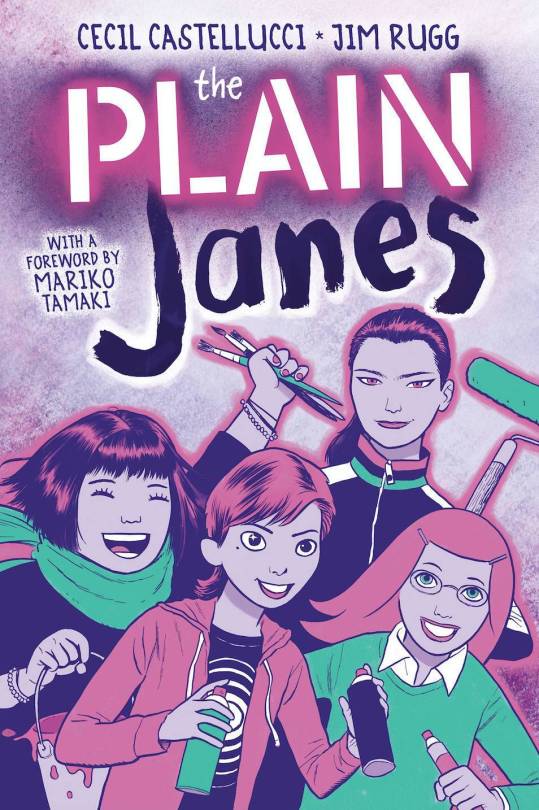
[I adored Cecil Castellucci and Jim Rugg's YA graphic novels The Plain Janes and Janes in Love, which were the defining titles for the late, lamented Minx imprint from DC comics. A decade later, the creators have gotten the rights back and there's a new edition Little, Brown. We're honored to have an exclusive transcript of Cecil and Jim in conversation, discussing the origins of Plain Janes. Make no mistake: this reissue is amazing news, and Plain James is an underappreciated monster of a classic, finally getting another day in the spotlight. If you haven't read it, consider yourself lucky, because you're about to get another chance. -Cory]
Cecil to Jim: How interesting or difficult was it for you to go back to match a style from 11 years ago?
Jim: It was impossible!
When I started drawing Janes Attack Back, I was so anxious. You can’t unlearn how to ride a bike and a lot of my style from 11 years ago included my limitations as an artist. I hope I’m much better now than I was then. But when it comes to style, I just couldn’t quite do it the same. After a page or two, I stopped trying. I figured that as long as the character designs, grayscaling, and lettering were consistent that it would be a 90 percent match. Combined with the different ink colors, I think it flows pretty well. But it was definitely tough to figure out in the beginning.
It was interesting for me to revisit the original art and to get back into characters that I had spent so much time with, but that was over 10 years ago. It was a very strange feeling in my head. Nostalgic but also filtered through thousands of pages of progress since I drew the first two books. It was like studying a different artist, trying to get back to that style.
How much of an issue was this from a writing perspective?
Cecil: It was the same!
When we first did Plain Janes it was my first time moving from prose to comics and I remember that I called you up crying once because moving the story from panel to panel was so difficult to figure out at first. Comics is not prose! But now I have a better understanding of comics and I would write those books way differently now. So it was hard to go back to being more naive. But it was an interesting challenge for sure.
Cecil to Jim: We had sort of hammered out this story as a four book thing back in 200. For Janes Attack Back, we compressed. Is there anything that we left out that you kind of wish we’d been able to keep?
Jim: I’m very happy with how this turned out. I remember we planned to have the Janes all go their separate ways for the summer. I think you did a terrific job compressing that. We still see them do their own things and drift apart. I like these characters so our original plans were fun--seeing them on their own allowed a different side of them to emerge.
But I think the story works best in this final version. I don’t miss the longer solo adventures. Although I refer to the Janes as my X-Men, since they are a team, and team books often have spinoffs where characters have solo adventures. So maybe a longer solo adventure would be fun. I did draw quite a bit of Brain Jane at space camp many years ago! But overall, I say no. I’m so happy with this final story that I don’t regret anything we cut to make this final story! Who knows, we could always follow the Janes as they go off to different colleges and post high school adventures...
Cecil: I’m glad I have those Brain Jayne space camp pages. But yeah, I don’t miss their solo stuff. I’m glad that we just really follow Main Jane. But it’s interesting because I think that kind of goes with the question above. I think writing that whole Janes Go Summer was the book that I would never write now because I’ve learned that you can just go to the next best part and you don’t have to tell every part. Like moving time from panel to panel.
Cecil to Jim: What was the hardest thing to draw? And which art attack did you love the most?
Jim: Not exactly an art attack, but I think my favorite art thing was when Jane visits the museum in France and she appears in several paintings. That was fun to draw, but also it fit the story perfectly. As a cartoonist, that’s the best I can hope for--when the art gets to shine within the context of the story. That moment feels magical to me--in terms of both the story and the art.
Does the school dance count as an art attack? I like flowers so when the gang covered their dresses in flowers and Brain Jane hit them with a spotlight, that was something I enjoyed drawing.
Cars are hard to draw. Kissing is hard to draw. Crowds are tough. Perspective...I could go on and on!
Jim to Cecil: Craft--is there a difference between writing a novel and writing a graphic novel? If so, what are those differences?
Cecil: There are more words in prose. That seems obvious, but it’s a big deal because that’s what you paint your pictures with. So you can really dive into the minutiae of a moment but it’s very different than with comics where you dive into a moment because you are really dictating what you want the brain to pay attention to. And you have to really understand that each reader is going to have a wildly different understanding of what that picture should be. In comics, it’s right there. So you can be very specific and focused and the words are not really important. They are but I throw out a lot of them.
I think I over-write my script as a scaffolding for you, the artist, so you don’t have to do all the mental heavy lifting. But the best thing about comics is the throwing out of words. And silence. You can use words to describe silence but it’s still very busy and loud. But in a comic, a silent page or panel speaks for itself, and you can have a pause and rest that you can’t have in prose. I love writing both and that is why I really think that a story tells you how it best wants to be told. Because prose and comics have different gifts in terms of telling the tale.
Jim to Cecil: I sometimes describe The PLAIN Janes as my X-Men comic since it is a “team” book. So I’m curious if you have a favorite character in The PLAIN Janes?
Cecil: Oh! That’s so hard! I mean of course it is a team book and I love that you always referred to it as an X-men comic. They are superheroes in my mind; each overcoming things inside of them and bringing their own special skill to solve a problem.
But it’s too hard to pick which one I love! I mean, I identify with all of them for different reasons at different times. I guess that is what makes a good team. But I do have a soft spot for both Brain Jayne and Theater Jane. I think that they both have such distinct voices and points of view that they were fun foils to write for Main Jane.
Do you have a favorite?
Jim: I love Theater Jane’s exuberance! And of course there are things I love about all of them. Good job on giving them unique traits and personality. But I would say in the end, I enjoyed Payne. She was a foil and heel and that brought the best out of all of the Janes. She was like a mirror that forced the Janes, especially Main Jane to really think about her values and what she wanted to do in her art practice. We had talked about Payne for a decade. Seeing her in action and seeing Main Jane play off of her was the best. Plus her anger at the status quo is something I remember feeling as a teenager.
Jim to Cecil: Write what you know, right? With that in mind, what parts of The PLAIN Janes are closest to your own personal experiences/truth?
Cecil: Yes. Although the apple doesn’t fall far from the tree, of course it is put through the ringer and shook up to come out as something very different. Like Main Jane, I was in a bombing when I was young. The IRA blew up a stage where the British Army band was playing. I was in the most damaged house, a beer museum. A window shattered above me and it was very scary. (I write about this incident in my memoir, Girl on Film).
I remember the next day, my family took me to an art museum and there were huge skylight windows everywhere, and I thought they would explode down on me. So I kept focusing on the art. And so while no one was injured in the attack that I was in, and I did not find a John Doe, I certainly found solace in art when I most needed it.
Another thing that came from my life directly was just engaging in street art and loving conceptual art. How that kind of art can say so much and be so profound. I’ve talked before about walking through subway stations filled with Keith Haring chalk drawings in the 80s and that being so inspiring. That idea of art being everywhere and being a delightful surprise. The core truth of The PLAIN Janes is that ART SAVES. That is probably the most true thing I believe.
How about you? Was there anything that you brought to the book that was close to your experience or truth?
Cecil: I was an art kid in school, so that made sense. And also the feeling, like I was an outsider and wanted more than school and a small town could provide. Some of the art class stuff brings back memories. The biggest thing for me were the friendships. The way the Janes pulled for each other and supported each other as they followed their own interests. I’ve been lucky to have that kind of support in my life. Some of those moments felt true to my own experience. And yes, I believe art saved my life--whether it was the stories and art I consumed or made. It had a huge impact on my life and helped through good and bad times.
The Plain Janes [Cecil Castellucci and Jim Rugg/Little Brown]
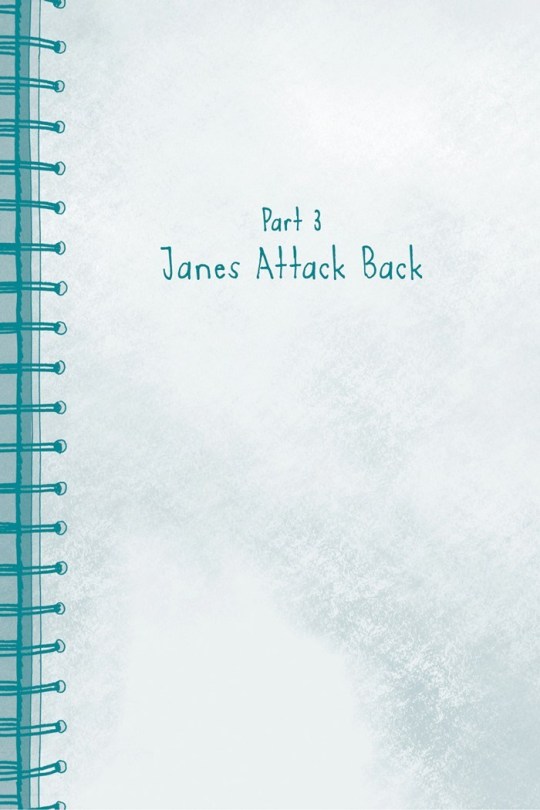

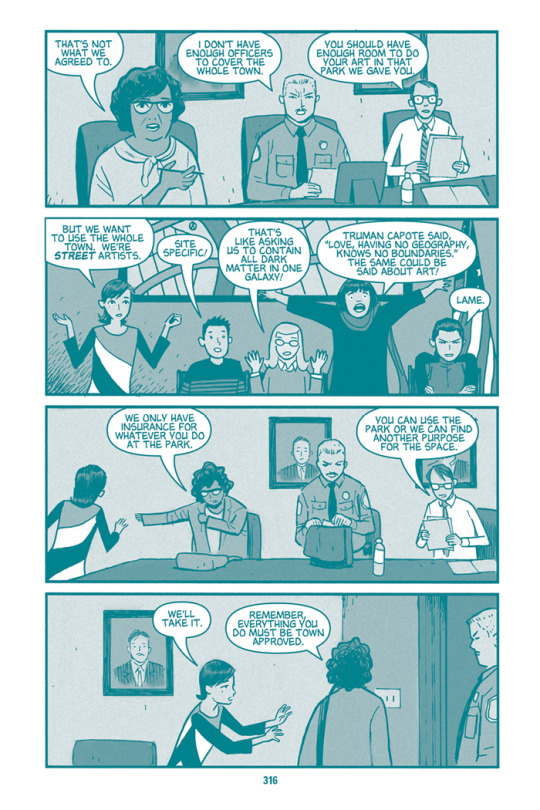

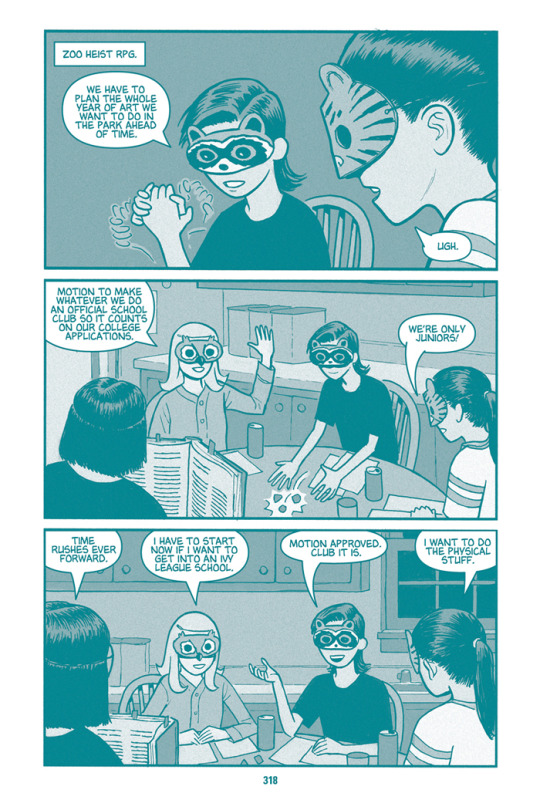
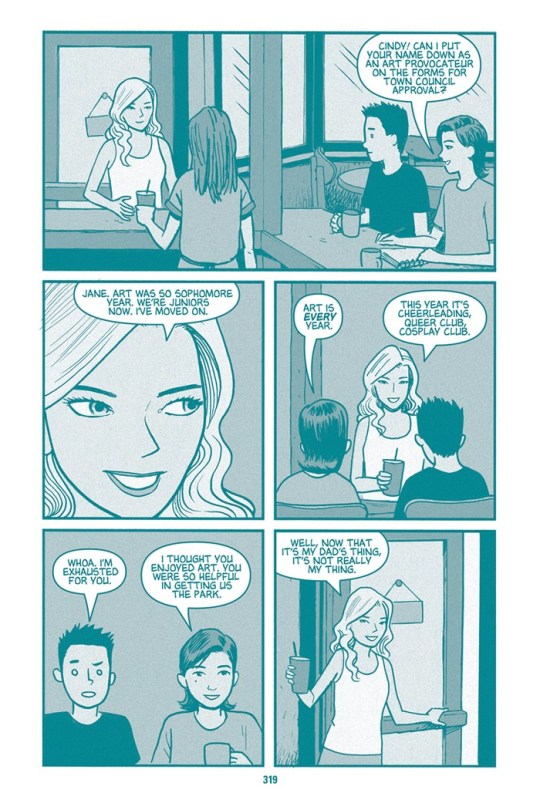
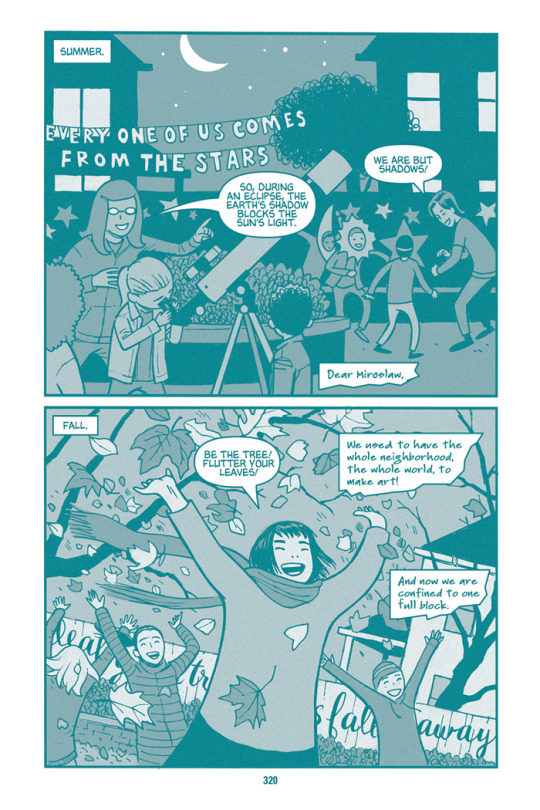

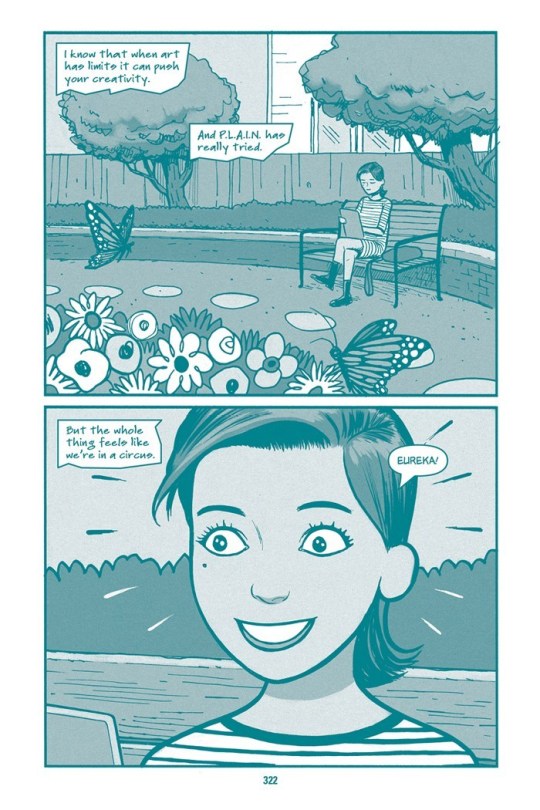
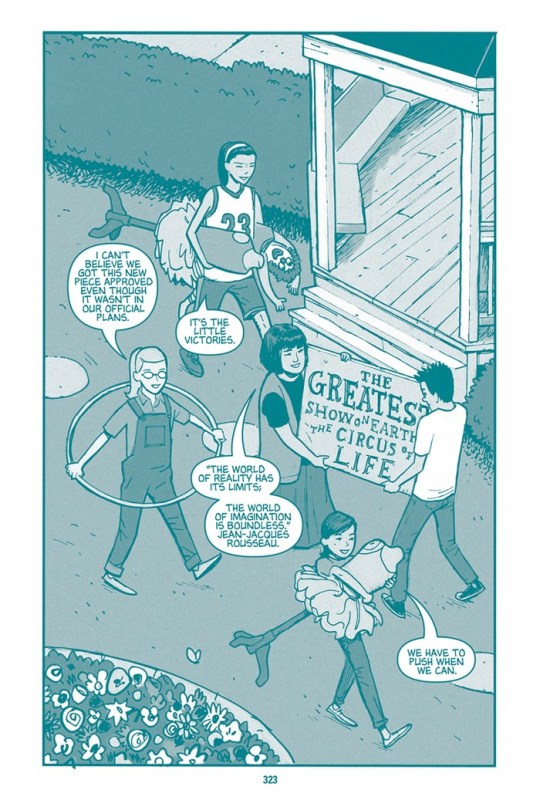
https://boingboing.net/2020/01/07/janes-janes-janes.html
9 notes
·
View notes